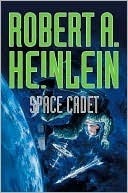What do you think?
Rate this book


228 pages, Kindle Edition
First published January 1, 1948

This was a pleasure to re-read, 36 years after I first read it and 72 years after it was published. It suffers neither from the long and pointless dialogs of Heinlein’s later work, nor the weak writing issues of other earlier works (like Beyond This Horizon). The narrative moves quickly, the dialog feels natural (for the 1940s), and the exposition almost feels like it isn’t there because it’s fit in so naturally.
(I published a longer review on my website.)